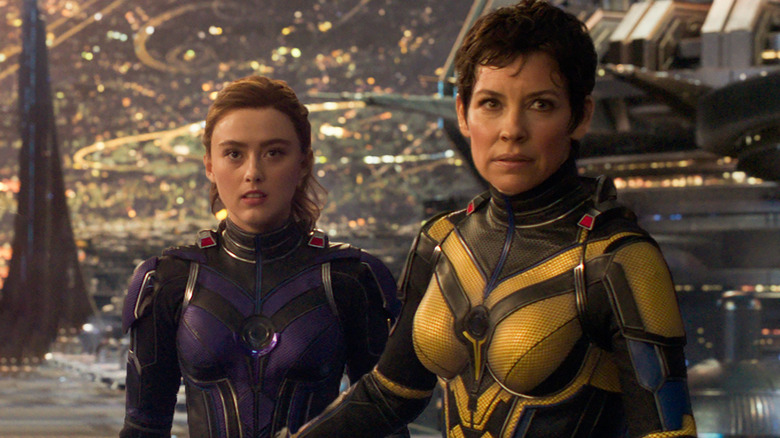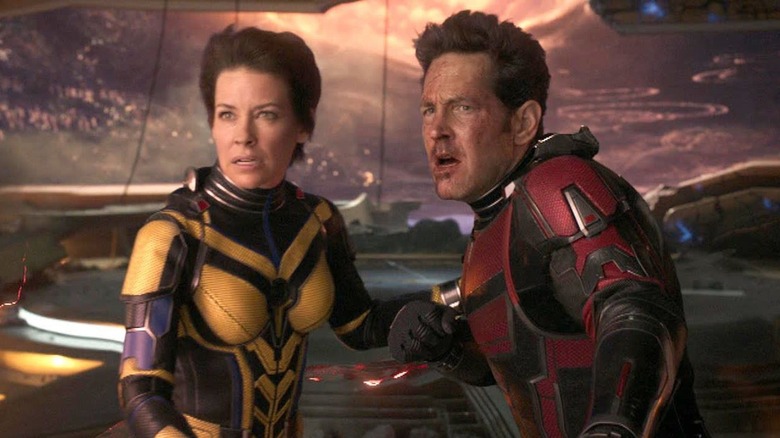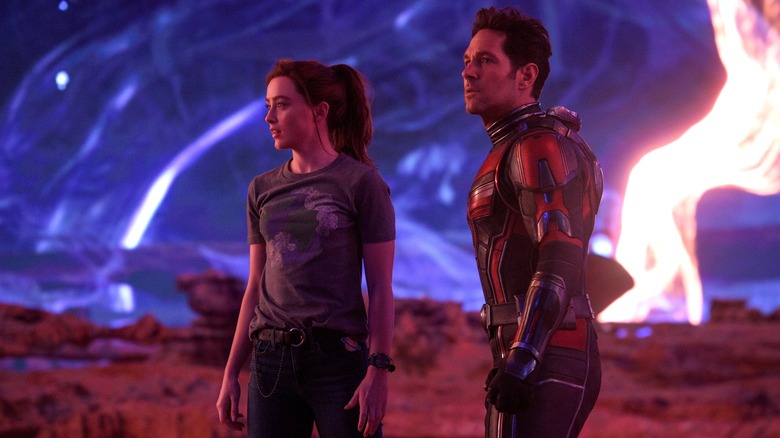Evangeline Lilly Explains Hope's 'Stepmom' Relationship With Cassie In Quantumania
For the more casual moviegoers in the audience, one of the most jarring aspects of "Ant-Man and the Wasp: Quantumania" is the age of Cassie Lang, now played by Kathryn Newton. In the first "Ant-Man" movie she was an adorable little six-year-old; now she's an 18 year old whose first scene finds her getting out of jail for the second time. Cassie just as rebellious as Scott (Paul Rudd) was around her age, which is terrifying for Scott. How'd she change so much in seemingly so little time?
The answer is fairly simple: the snap happened, followed by a five-year time jump in "Endgame," followed by a few years of normalcy after the blip brought everyone back. As one of the 50% percent of people who didn't vanish from the snap, Cassie has aged far more than other young characters in the MCU in the same amount of time. That creates the strained family dynamics at the start of "Quantumania," where Scott is struggling to accept that Cassie has matured a lot since "Ant-Man and the Wasp." He keeps treating her like a kid, which Cassie finds frustrating.
Meanwhile, Scott's girlfriend Hope Van Dyne (Evangeline Lilly) has handled the transition far more gracefully, treating Cassie as the 18 year old she actually is. It helps, of course, that Hope became a part of Cassie's family much later than Scott did. As Lilly explained in a recent interview with The Hollywood Reporter:
"Hope didn't change Cassie's diapers, and she didn't nurse her wounded knees when she fell off her bike. She never knew her in that intimate way, and so she just regards her as this really capable, brilliant, wonderful young woman. She doesn't see her as a little girl that needs coddling or protecting, and I think she's a bit baffled by the fact that Scott does."
Avoiding her mother's mistakes
Hope's willingness to treat Cassie like a fellow adult also stems from her frustration with her own mother, Janet (Michelle Pfeiffer), whose biggest flaw is may be her failure to treat Hope as an adult capable of handling tough information. Janet has declined to tell Hope anything about her time down in the Quantum Realm, and her lie that there were no other people down there allows Hope, Cassie, and Hank (Michael Douglas) to unwittingly build a trap and walk the whole family right into it. Janet's inability to be straight with her own daughter makes Hope determined to always play it straight with Cassie, even if that means giving her perhaps a little too much freedom for her age.
"It's that thing where you want to do the exact opposite thing of what your parents did to hurt you," Lilly explained. "And so she really lets Cassie in and she gives her a seat at the table and she trusts her with information that maybe she shouldn't, that maybe is beyond Cassie. But the film will tell us whether or not Cassie should have been trusted with all of that."
It's a complicated question, of course. While 18 is technically an adult, it's also pretty young still, maybe too young for someone to be trusted with such dangerous, advanced technology (Cassie isn't even old enough to buy a beer in most U.S. states). But as the entire premise of "Quantumania" makes clear, not trusting your kid with anything can put them in even more danger.
Underlining one strength of the MCU films
Cassie's rapid ageing might be a little disconcerting if you watch the three "Ant-Man" movies back-to-back, but this element is also one of the things that make the MCU so special: by this point, these characters have so much history behind them, and it helps them feel like real people in a way you usually wouldn't get in other superhero films. The events of previous MCU movies have a clear ripple effect into later movies.
The easier choice for Marvel would've been to have Scott's daughter vanish in the snap as well, so Cassie's relationship with the rest of the family could continue smoothly along the expected trajectory of the first two "Ant-Man" installments. But by having Cassie grow up so quickly thanks to the events of "Avengers: Infinity War" and "Avengers: Endgame," this movie further emphasizes just how connected everything in the MCU is. That interconnectedness can be suffocating at times — it's what leads to the accusation that most of these MCU movies feel too similar — but it can also be deeply rewarding when it's handled with care.
"Ant-Man and the Wasp: Quantumania" is out in theaters now.


